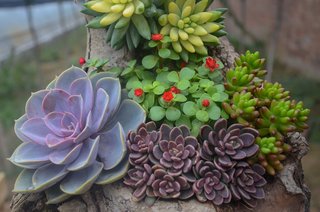Perhaps you just found that you left your succulents out in the rain, and you’re panicking as you’re trying to figure out if the rain will kill them. Thinking of how too much water can lead to root rot, you fear that this will be the last of them. How do you proceed?
Don’t Panic!
First, you need to understand where the true danger comes from with the rain. It isn’t necessarily the rain that will be the problem for your succulents. In fact, what kills succulents more often than not comes from the water holding in with the soil. If it remains there for too long, it can lead to bacteria and fungus, which leads to root rot.
Cactuses categorize as succulents, and in fact, they don’t have any problem with the rain in the wild. The issue comes when the rain comes and the moisture stays in the ground. That will kill your succulents.
Succulents Like Rain
Provided you have set up your plant pots correctly, they may even get a boost from rain water. The rain boosts their health and wellness because it gives them extra water. The key as I’ve said before with succulents is that you do the soak-and-dry method.
In other words, you soak the succulents, and you don’t water them again until the soil has dried out entirely. With rain water, they should also be okay because of how succulents in the outdoors will dry faster because of better air circulation than indoors.
How Much Rain is Too Much?
In general, once a week should be okay like with a regular watering schedule, but you probably don’t want them to experience a full week of rain because this could do some serious harm to your succulents. You may find that you have to treat your succulents for root rot after, which isn’t a pleasant experience. You want to handle the problem as much as possible without worries.
One thing that you can do if your area is experiencing a lot of rain is that you could move them under the eaves, or you could take them indoors. If you accidentally left your succulents out in the rain for a single day, it depends on the species of succulent, but in most cases, it won’t cause any harm. Rain can kill ultra sensitive succulents, but the vast majority of them will be fine for a day in the rain.
How to Protect Your Succulents
To protect your succulents in general, you should understand what succulents prefer. They prefer a potting mix to where it will dry out in between getting watered. That is because of how succulents come from dry and arid regions where they may not experience a lot of rain.
Some of the places where you want to keep them away from includes:
- Too much rain
- Too much shade
- Pots without drainage
- Flooded gardens
- Heavy soil
Any one of these things can lead to the death of your succulents. As much as possible, you want to prevent them from dying because of receiving too much rain.
If you were to plant succulents in your garden, you should understand how you could do that without a problem. The one thing to understand, however, is that you don’t want to plant them in an area prone to flooding because of how this can lead to root rot that will kill your succulent.
For succulents to live happily in the outdoors, you should never plant them in an area where water has a lot of trouble with draining. You will also want to make the soil more breathable. For example, you will use perilite, mulch and potting mix together to get the best results.
Rain Isn’t as Dangerous as This
While we’re looking at rain, we should highlight another danger that can have a drastic impact on your succulents: frost. If you live in an area that sees frost, this can have a dramatic impact on it. Depending on how low the temperatures drop, your succulents could show varying degrees of damage.
Especially if you have hard frost which means that the temperatures drop below freezing for hours, that can completely collapse your plants. To address this, you have to either live in a warmer climate like Arizona or somewhere without frost, or take your succulents inside before a frost. In general, this is the rule of thumb with regular plants as well. Don’t leave them exposed to frost because nothing kills them faster.
Why Shade Can Be Bad for Succulents
A lot of succulents prefer the sun, and they do better in the sun. Shade can prove damaging to your succulents for multiple reasons. First, they don’t receive the sunlight necessary for growth. Second, if it rains on your succulents, the rain water in the ground won’t dry up as quickly, which can be damaging.
For that reason, you usually want to plant your succulents in a sunny area of your property if you were to plant them outside.
Beware of Trays
In particular, you should especially exercise caution with trays in the outdoors. When you put your succulents on a tray, it might look harmless, but there is a big problem with it. If the rainwater floods, it won’t dry off the tray, and this will leave your succulents exposed to wet soil that remains wet. That can have a drastically negative impact.
Especially if you don’t realize this, it could leave your plants dead. They might be okay for a day if you quickly moved them to a dryer region, but this can kill your plants fast. Don’t let a tray become a death chamber for your succulents.
Why is Rain Good for Your Succulents?
Rain is good for your succulents because of how it is much healthier than water from the tap. The problem with water from the tap is that it will often come with chlorine, and fluoride, which won’t harm your plant, but it isn’t as good for them as what good rainwater would be if you were to get it for them.
Many gardeners have even chosen to collect rainwater because of the benefits that you get from using it for watering plants. You will see them grow even more.
With succulents, the biggest impact on them won’t be the rain. Instead, it will be the soil that you planted them in.
Here’s the rule of thumb with succulents and the rain: As long as you take the right precautionary measures to protect your succulents, you shouldn’t experience too much for problems. If you failed to take the right precautionary measures like proper drainage and using the right soil, you might have some problems, but it won’t matter in most cases otherwise.

